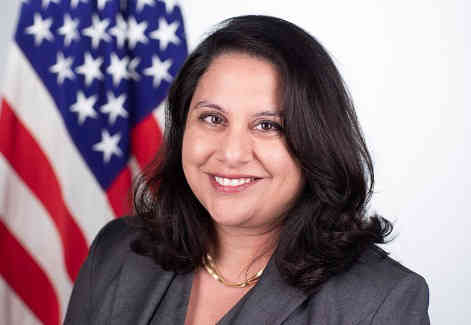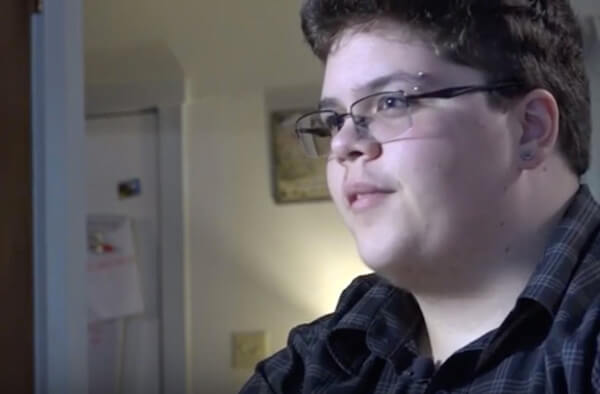BY ARTHUR S. LEONARD | May has brought a flood of litigation over LGBT rights in the federal courts. With the month not even at its mid-point, half a dozen lawsuits have been filed in US district courts related to either the transgender bathroom issue or continuing state-level resistance to marriage equality.
First out of the box was a lawsuit filed in federal court in Chicago on May 4 by two right-wing litigation groups — the Thomas More Society and the Alliance Defending Freedom — challenging the US Department of Education’s agreement with Township School District 21, in the Chicago suburb of Palatine, that settled a lawsuit about transgender restroom access. Under the settlement agreement, the school district will allow transgender students to use restrooms and other facilities consistent with their gender identity.
The case stirred considerable local controversy, and the litigation groups were able to recruit five students and their parents, banding together as “Students and Parents for Privacy,” to mount a challenge. They argue that the students have a fundamental constitutional right of “bodily privacy” that is violated when transgender students show up in the restroom, that the settlement violates the parents’ fundamental right to direct the education and upbringing of their children by exposing the children to trans youth in their midst, and, perhaps most importantly, that the Education Department’s position that gender identity discrimination violates Title IX of the Education Amendments Act — a federal law that bans sex discrimination in schools that receive federal money — is a misinterpretation of that statute that was not validly adopted.
Federal cases emerge over restricting transgender facilities access, same-sex couples getting marriage licenses
This last argument, unfortunately, rests on a plausible reading of the Administrative Procedure Act, a federal statute that specifies procedures that federal agencies must follow when they adopt new regulations. While the Education Department has not adopted a regulation on the subject, the plaintiffs make a strong argument that its enforcement of its interpretation is tantamount to a regulation. The plaintiffs argue that the Department is therefore not free to take such a position without going through the Administrative Procedure Act formalities. The plaintiffs note that the position the government is now taking was consistently rejected for the first several decades after Title IX was enacted in the early 1970s.
If the courts agree, the Department would have to go through a time-consuming process that could stretch out over many months in order to adopt a valid regulation, and then the regulation would be subject to challenge in the federal appeals courts, which could tie it up in litigation for years.
On the other hand, many of the plaintiffs’ arguments have already been rejected by the Richmond-based Fourth Circuit Court of Appeals, when it ruled on April 19 that a district court in Virginia should have deferred to the Education Department’s interpretation of Title IX in a case brought by a transgender boy seeking appropriate restroom access in his Virginia high school. That ruling turned on the court’s agreement with the Education Department that existing statutory provisions and regulations — which allow schools to maintain separate restrooms for males and females — were ambiguous as to how to treat transgender people, justifying the Department in adopting a position consistent with its view of the law’s purpose in providing equal educational opportunity.
In the Chicago lawsuit, the plaintiffs argue that the statute and regulations are not ambiguous, but this rests on their assertion that the Congress that passed Title IX more than four decades ago could not have intended any meaning for the term “sex” other than “biological sex” as determined at birth.
The Fourth Circuit, by contrast, found that the term “sex,” without any explanatory statutory definition, could have a variety of meanings depending on the context, and is therefore inherently ambiguous.
Chicago is in the Seventh Circuit, so the Fourth Circuit’s ruling is not binding on the lawsuit filed there. More than 30 years ago, the Seventh Circuit ruled in a case under Title VII of the Civil Rights Act that discrimination because of gender identity did not violate the 1964 law’s sex discrimination provision and so the federal court in Chicago may find itself constrained, if not directly bound, by that precedent under a different but parallel statute — even though 30 years of developments in the courts have arguably rendered it obsolete.
Federal courts have generally held that the term “sex” in Title VII and Title IX should be given the same meaning, and that cases construing one of those statutes can be consulted when construing the other.
Dueling Suits in North Carolina On May 9, five days after the Chicago case was filed, there was a flurry of new litigation in the US District Courts of North Carolina, focused on the bathroom provisions of H.B. 2, introduced into the legislature, approved by both houses, and signed by Governor Pat McCrory all in one day, March 23. The law wiped out local government bans on sexual orientation and gender identity discrimination, quashed the right of North Carolinians to sue for any kind of discrimination in state courts, and prohibited localities from adopting their own rules on government contracting and minimum wages. Most controversially, it provided that in all public facilities with restrooms, changing rooms, locker rooms, and the like, multi-occupancy facilities must be segregated by biological sex as defined on a person’s birth certificate.
The state’s attorney general, Democrat Roy Cooper, who will face McCrory in the governor’s reelection bid in November, denounced the measure as discriminatory and said his office would not defend it.
Lambda Legal and the American Civil Liberties Union filed a federal lawsuit in the Middle District of North Carolina on March 28, challenging portions of H.B. 2 under the 14th Amendment and Title IX. One of the transgender plaintiffs in the case has since also filed charges of discrimination under Title VII with the Equal Employment Opportunity Commission (EEOC), which last year ruled that Title VII requires employers to allow transgender employees to use restrooms consistent with their gender identity.
Within a few weeks of Lambda and the ACLU moving forward, the Fourth Circuit’s April 19 ruling in the Virginia Title IX case placed the legality of the bathroom provisions in doubt.
The controversy surrounding H.B. 2, especially the bathroom provision and the preemption of local anti-discrimination ordinances, caused adverse reactions that echoed throughout the country as governors and mayors prohibited official travel to North Carolina, some major employers announced reconsideration of plans to locate facilities there, and conventions and major musical performers canceled activities in the state.
But McCrory and Republican state legislative leaders have rejected calls to rescind the statute.
The Justice Department weighed in early in May, when the Civil Rights Division sent a letter to McCrory, who had been vigorously defending the law in national media, informing him that the federal government considered the bathroom provision in violation of federal sex discrimination laws and demanding a response by May 9.
McCrory’s response was to file a lawsuit on May 9, seeking a declaration from the federal district court in the Eastern District of North Carolina that the bathroom provisions do not violate federal civil rights laws.
US Attorney General Loretta Lynch then held a press conference at which she unveiled a new lawsuit by the federal government against North Carolina, filed in the Middle District of North Carolina, seeking a declaration that the bathroom provision violates federal law.
Lynch’s statement, which quickly went viral on the Internet, promised transgender people that the federal government recognized them and was standing behind them, thus putting the full weight of the Justice Department on the line in backing the Education Department and the EEOC in their interpretations of “sex discrimination” under their respective statutes.
Given Cooper’s refusal to defend H.B. 2, McCrory retained a private lawyer, Karl S. Bowers, Jr., of Columbia, South Carolina, who filed the complaint co-signed by the governor’s general counsel, Robert C. Stephens, and local North Carolina attorneys from the Raleigh firm of Millberg Gordon Stewart PLLC. Presumably they will also be conducting the defense in the Justice Department’s case.
Their argument, consistent with McCrory’s public statements, was that the state was not discriminating against transgender people, merely requiring them to use alternative facilities in order to protect the privacy rights of others. The complaint echoed what the governor has termed a “common sense privacy policy” argument, and insisted that federal courts have “consistently” found that Title VII “does not protect transgender or transsexuality per se.”
While the complaint lists half a dozen federal court rulings supporting that position, it conveniently fails to note numerous court decisions holding to the contrary, including decisions by the Sixth Circuit Court of Appeals, based in Cincinnati, and district courts in many different states.
The Justice Department will probably move to transfer McCrory’s case to the Middle District of North Carolina, where it can be consolidated with the Justice Department’s lawsuit and perhaps the pending Lambda/ ACLU lawsuit.
There was another lawsuit defending H.B. 2 filed on May 9 in the Eastern District court by North Carolina Senate Leader Phil Berger and House Speaker Tim Moore, both Republicans, but it is hard to imagine they could have standing to bring a federal lawsuit on their own, so it is likely to be dismissed if the government makes a motion to that effect.
New Marriage Litigation in Mississippi
Meanwhile, there were also new litigation developments in Mississippi, challenging House Bill 1523, the so-called “Protecting Freedom of Conscience from Government Discrimination Act,” passed in response to the Supreme Court’s Obergefell marriage equality decision from last June. Subsequent to Obergefell, state legislators quickly went to work undermining it by devising H.B. 1523, which essentially gives government officials, businesses, and religious believers permission to discriminate against same-sex couples, provided that the discriminators have a sincere religious belief that marriage should only involve one man and one woman. The measure is scheduled to go into effect on July 1.
The lawsuit filed by the ACLU on May 9 in the federal court in Jackson, Mississippi, charges that H.B. 1523 violates the 14th Amendment “by subjecting the lawful marriages of same-sex couples to different terms and conditions than those accorded to different-sex couples.” In effect, Mississippi has set up a “separate but equal” framework, which “imposes a disadvantage, a separate status, and so a stigma upon all married same-sex couples in Mississippi.”
The lawsuit names as defendant the Mississippi state registrar of Vital Records, Judy Moulder.
Among its many discriminatory provisions, H.B. 1523 provides that government employees “who wish to recuse themselves from issuing marriage licenses to same-sex couples” will be required to notify Moulder, who must maintain a list of officials denying same-sex couples services routinely provided to different-sex couples. Those officials are responsible for making arrangements to insure that same-sex couples receive the services to which they are entitled from someone else, but the statute establishes no mechanism to ensure compliance with this provision.
The ACLU lawsuit seeks a declaration from the court that H.B. 1523 is unconstitutional “on its face” and an injunction against it going into effect. It was immediately followed by more court action, as New York attorney Roberta Kaplan, who represents the plaintiffs in the Mississippi marriage equality case that preceded Obergefell, filed a motion in federal district court on May 10, asking Judge Carlton Reeves to reopen the case so they can name Judy Moulder as an additional defendant and to modify his November 2014 marriage equality injunction to require the state to come up with procedures ensuing that same-sex couples seeking to marry encounter no delays due to state officials recusing themselves on religious grounds.
Indeed, Kaplan argues, anyone recusing themselves from serving same-sex couples should be disqualified from serving different-sex couples as well, since otherwise they would be failing in their obligations to provide non-discriminatory service. Kaplan’s motion also asks that the list of officials recusing themselves be posted on the Registrar of Vital Records website so that couples need not subject themselves to the indignity of being turned away when seeking a marriage license.




































